[ad_1]
Chris Andrews,BBC News NI
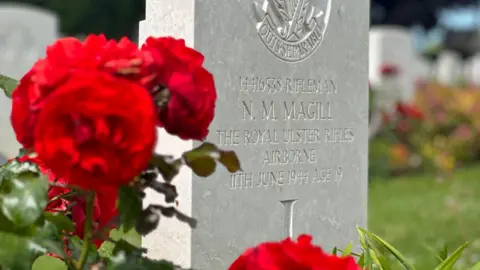 BBC
BBCEvents are being held across Northern Ireland to mark the 80th anniversary of D-Day.
Beacons will be lit in towns and cities at 21:15 on Thursday.
A veterans’ charity will also light one at the top of Slieve Donard to coincide with commemorations at the UK’s other highest peaks.
Among the events taking place, Belfast City Hall is being lit up blue and a reception will be held at 10:30.
D-Day anniversary events
In Lisburn, events begin early with a D-Day proclamation read by a town crier from the Irish Linen Centre and Lisburn Museum at 08:00.
This is followed by the unveiling of a flag of peace and a wreath laying by the Royal British Legion. A beacon will be lit on Thursday evening in Castle Gardens.
Beacons too are being lit in Newtownards, Bangor and Ballyhalbert.
In Armagh city, a service will be held at St Patrick’s Church of Ireland at 20:00 before the city’s beacon is lit in Market Square.
A town crier will read a proclamation at Enniskillen Castle from 08:00, with a service held at St Macartin’s Cathedral at 20:00.
Enniskillen Castle is also turning blue to mark the occasion.
In Ballynahinch, swing time and ballroom music events are being held in Market Square on Thursday evening before the lighting of the beacon at 21:15.
Portrush East Strand will hold an event featuring members of the armed forces and a pipes and drum performance before its beacon is lit at 21:15.
Elsewhere, in County Mayo, events will be held throughout the day at Blacksod Lighthouse, where the crucial weather forecast originated to give D-Day the green light.
Music and an aircraft flypast are planned, along with a panel discussion about Ireland’s role in the war.
Band of brothers
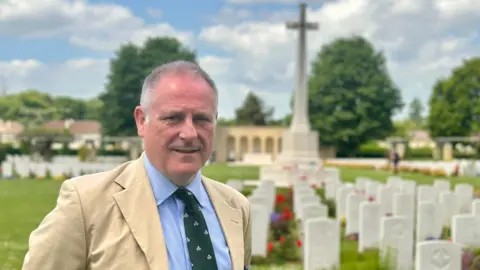
Allied troops who took part in D-Day “liberated the people of Europe from a great evil”, the regimental secretary of the Royal Irish Regiment (R IRISH) has said.
The R IRISH and Army Cadets from Northern Ireland are taking part in a week of services and commemorations to mark the 80th anniversary of the Normandy landings.
“I feel a brotherhood, having been a soldier, to everyone who lies in this field,” Lt Col (Retd) Andy Hart told BBC News NI during a visit to Ranville war cemetery on Wednesday.
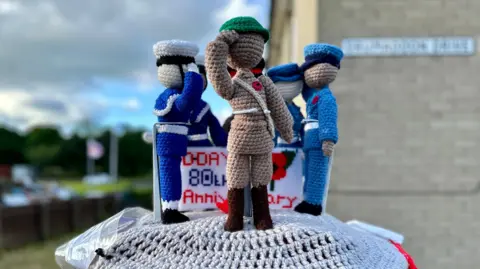
Among the 2,400 graves are Royal Ulster Rifles troops, such as Nathaniel Magill, from Sandy Row in Belfast.
One of eight children, the 19-year-old landed by glider near the town on 6 June 1944.
He was killed by a German sniper during the battle at Sainte-Honorine and Longueval.
His friend, Patrick Maguire from Monaghan, the R IRISH man explained, died 24 hours after landing and has no known grave.
“Identifying the unknown is really important,” he added.
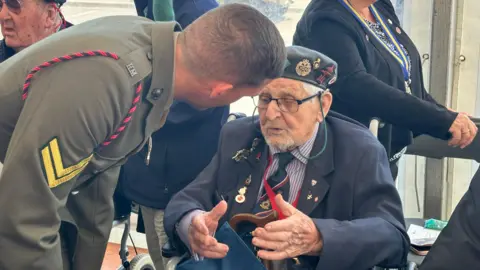
What happened on D-Day?
Codenamed Operation Overlord, the Allies’ invasion of France on 6 June 1944 marked a breakthrough in the war.
Shortly after midnight gliders landed as troops seized key locations on the flanks of the Normandy beaches.
By morning, tens of thousands of troops, involving soldiers from across Ireland, landed on five assault zones.
They were met by machine gun fire, mortar shells and snipers, but managed to push inland.
The battles to come would lead to the liberation of France and a push towards Berlin.
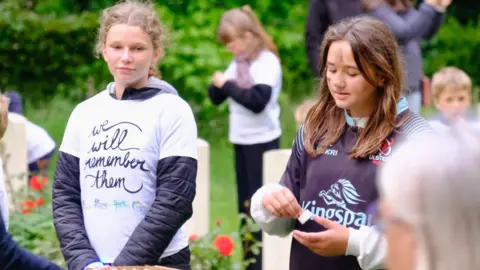
On Tuesday evening, candles were lit by children at graves in Cambes-en-Plaine, the resting place for several Royal Ulster Rifles 2nd Battalion soldiers who fought in Cambes Wood and the battle for Caen.
Outside, there is a monument in their honour and a road named Chemin des Royal Ulster Rifles.
They were among the tens of thousands of troops from the UK and the Irish Free State who formed part of the world’s largest sea and air invasion.
Further candlelit vigils were held on Wednesday evening, lit from the flame of the commemoration torch which was carried by ferry from Portsmouth by some of the remaining D-Day veterans.
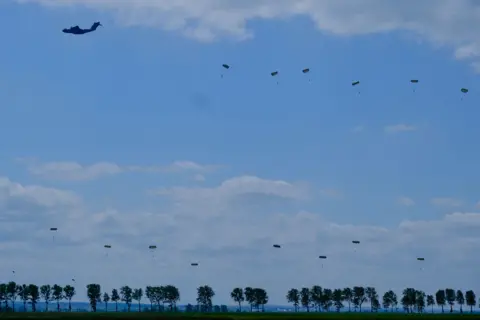
World leaders, including the King and US President Joe Biden will be attending major events in France on Thursday.
BBC Newsline and BBC Radio Ulster programmes are broadcasting live from Normandy this week.
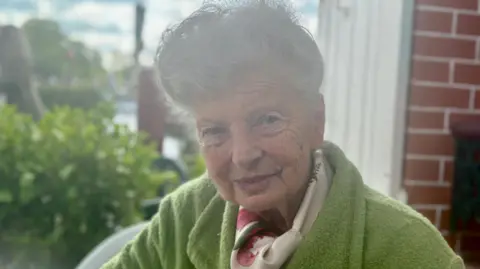
Arlette Gondrée, whose house at Pegasus Bridge was the first to be liberated on D-Day, said “the memories are kept on” of the RUR veterans who would come to her cafe.
“I want to emphasise the task of the RUR at Longueval because they had many casualties,” she said.
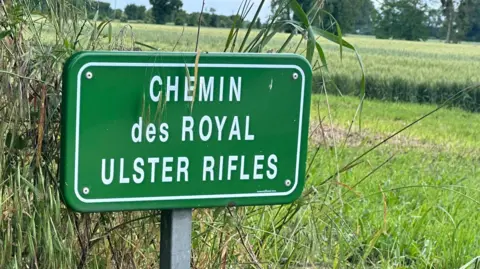
“They used to come back, very many of them, and then it was shrinking and they used to come and we had a lovely time with their piper.
”During their lifetime they put a plaque inside the cafe to the Ulster Rifles regiment of which I’m very proud.”
Romain Bail, the mayor of Ouistreham, told BBC News NI that 6 June is a more important anniversary in Normandy than Bastille Day.
“This is my duty, a part of my life, my identity,” he said.
[ad_2]
Source link freeslots dinogame telegram营销




